Authors love making social commentary in their craft.
There’s no safer way to make a potentially controversial remark about a particular issue than drag a bunch of fictional people through the coals of it. It’s like holding up a mirror to society, but not as direct. The deniers can still deny if they choose to do so. I love a story that takes a concept, puts it in an interesting plot, and makes a statement about life and society. It can be so refreshing to read.
If social commentary in fiction is to be talked about, an author that can be a perfect example is Jane Austen. Though the theme of her stories is usually romance, her plotlines are almost always laced with witty and mocking statements about the society she lived in. You’ve probably heard of “Pride and Prejudice” (1818). It’s safe to say that it’s probably her most famous novel. Beneath the timeless classic filled with deep and complex characters and an unforgettable plot, Jane Austen explores how the 19th century English society pushes women to depend on marriage in the pursuit of economic security and social standing. Despite being over 200 years old, it still creates quite an impact with the way it portrays class, status and gender differences.
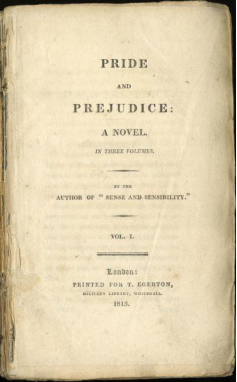
“Pride and Prejudice” (1818) by Jane Austin, first edition cover
Let’s skip a hundred years later and look at “The Great Gatsby” (1925) by Scott F. Fitzgerald. Set in Long Island, New York, during the roaring 20s, this literary masterpiece tells the story of young millionaire Jay Gatsby and his obsession for the beautiful Daisy Buchanan. I know many high schoolers, especially those that live in the US, have been forced to read this book and might be a little skeptical about me saying it’s an amazing book, but the book has so much to say about the sociology of class, status and wealth, and I find the way Fitzgerald looks at the American Dream in a somewhat cynical way extremely interesting.
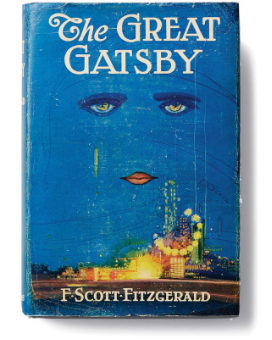
“The Great Gatsby” (1825) by Scott F. Fitzgerald, first edition cover
Okay, let’s come to more modern times. Authors still haven’t stopped social commentary in their books. Last month I read a novel by Hilary Jordan called “When She Woke” (2011). It follows the theme of the classic novel “The Scarlet Letter,” and it is set in a society where the skin of criminals is tinted different colors, depending on their crimes. This marking makes them subject to derision, physical attacks and even death threats. The story is pretty decent, the ending isn’t as strong as the beginning, but the topics that can be exhibited by the premise are very fascinating. It can easily spark plenty of discussions on abortion, moral values, crime and punishment.
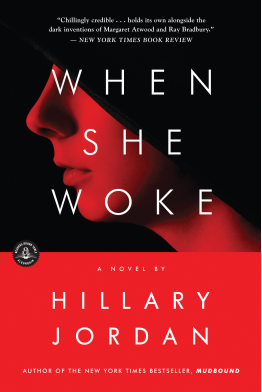
“When She Woke” (2011) by Hillary Jordan front cover
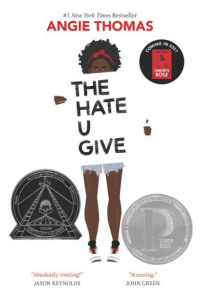
“The Hate U Give” (2017) by Angie Thomas, front cover
The most recent novel on social commentary I can think of is “The Hate U Give” (2017) by Angie Thomas. If you haven’t read the book, you HAD to have seen the movie. If you did neither, I’d suggest you go find a copy, because this was one of the most powerful pieces of literary fiction I have read since I started reading. I think it can have much more impact on the youth than all the classic novels because this is a story that is set in our current society, talking about police brutality and racial injustice. The story follows a teenage African-American girl called Starr, who recently witnessed her friend being killed by a policeman who stopped them on the road. The plot then progresses from this point on, raising strong questions about racism and racial differences, gang violence, class and human values.
To be honest, writing a book with some strong perspectives and comments about society can be a risky move, especially for an author who has a lot to say in their stories. Backlash can be a bit severe, and it can be rough on the author to see the story they worked hard for being slandered by people they don’t even know on the internet. It’s amusing that some people don’t even read the book they’re so angry about. There’s this mob mentality that they have, joining a group of people who are angry at a simple work of fiction simply because they don’t agree with what they are saying. This pushes authors from not being able to properly express what they think for fear of uproar, and their works would rarely have the impact they were hoping they would. Or, authors would think of another way to make a few comments, one which has a much lower risk of backlash, by using symbolism.
“Animal Farm” is an allegorical novel—which is a type of novel that can be interpreted to reveal hidden meanings—by George Orwell, published in 1945. The book tells the story of a group of farm animals who rebel against their human farmer, hoping to create a society where the animals can be equal, free, and happy. Ultimately, however, the rebellion is betrayed, and the farm ends up in a state as bad as it was before, under the dictatorship of a pig named Napoleon. It’s a pretty fascinating novel in itself, but things get even more interesting when you find out that the fable actually reflects events leading up to the Russian Revolution of 1917 and then on into the Stalinist era of the Soviet Union. In a letter to Yvonne Davet, Orwell described “Animal Farm” as a satirical tale against Stalin, and in his essay “Why I Write” (1946), he wrote that “Animal Farm” was the first book in which he tried, with full consciousness of what he was doing, “to fuse political purpose and artistic purpose into one whole.” The only thing more interesting than literature with commentary, is literature with allegorical commentary.
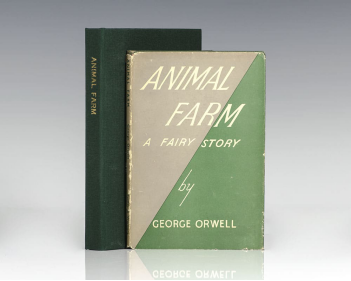
“Animal Farm” (1945) by George Orwell, first edition
Hopefully, more books can appear in the coming years, especially since 2020 was a rather volatile time in the United States and in the world. On top of that, so many social issues have been brought up in the past months, and it can be expected to fuel more authors to use their talents to write some more intriguing social commentary. A book can have quite an impact on its reader when done well, and it can be beneficial for many readers to be impacted by a good story after these dark times.

